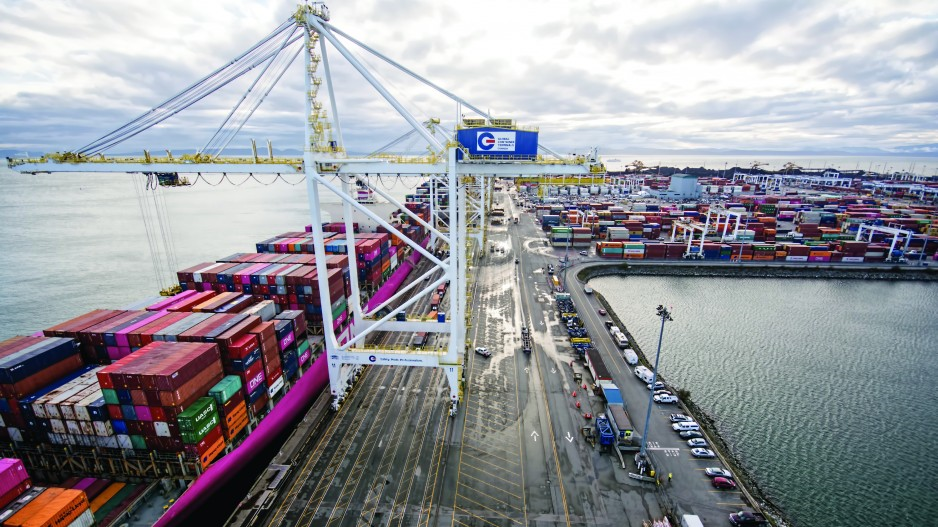GCT Global Container Terminals wants the public to clearly understand our position concerning the prospect of sweeping changes to the way goods are moved in and out of our region, province and country.
We think it’s a convincing one.
Recent claims made publicly and through the media suggest the Port of Vancouver’s proposed Roberts Bank Terminal 2 container terminal project, which includes building an entirely new 164-hectare island in the Salish Sea, is the ideal way forward for our nation’s future.
We disagree.
GCT Canada, the operator of the GCT Deltaport container terminal at Roberts Bank has long argued that our proposal for a smaller (56-hectare), less expensive expansion, Deltaport Berth 4 (DP4) is a right-sized solution compared with the massive Terminal 2 mega-project, Roberts Bank Terminal 2 (RBT2).
Consider the costs alone: our privately funded proposal comes in at $1.6+ billion compared to a $3.7+ billion, taxpayer-funded mega project.
RBT2 will not provide supply chain support now, as it is not expected to be completed until at least 2033. Yes, new capacity may be needed in the mid-2030s, at the earliest, and more likely not until closer to 2040. However, published data shows lower volumes across the board as of mid-2022, including: laden container cargo, container cargo by tonnage and vessel calls.
And, the RBT2 project is not the answer to supply chain resiliency for Canada - no container terminal is. RBT2 remains connected to the exact same rail lines and inland infrastructure as the current terminals—it would have been sitting idle last year during the floods, which washed rail lines out.
There are already two planned, privately-funded projects to increase West Coast container terminal capacity and resilience, in Prince Rupert and Vancouver, incrementally, as it is needed, with less impact on the environment and without costing taxpayers close to $4 billion. These projects have a business case and experienced operators.
We believe much of the conversation about expansion plans has been shaped by poor forecasting, along with ballooning cost projections and timelines and latching onto supply chain challenges that would not be addressed through a container terminal project.
So, let’s talk about capacity and timelines.
The RBT2 project will not bring on capacity sooner. It cannot be completed until 2033 at the earliest. GCT’s Deltaport Berth 4 expansion can be built in the same timeframe, since it has half the construction period compared to the Port’s RBT2 new, artificial island, megaproject which requires nearly 10 years to build.
As for pricing and competitiveness, there are already two competitive container terminal operators in the Port of Vancouver: Dubai Ports World and GCT Global Container Terminals. This is similar to the structure in all other ports across Canada which have one or two operators.
As of now, the Port of Vancouver’s RBT2 lacks a willing terminal operator. If one is identified, it is an open question as to how they will recover costs associated with the terminal construction and how automated their operations will be.
We know that RBT2 will be one of the most expensive - and taxpayer-funded - container terminal construction projects in the history of the sector - worldwide. The required increased port rates to offset this expense will make the Vancouver gateway uncompetitive. This is what will drive shippers to other ports, not a lack of capacity at Canada’s West Coast terminals.
Perhaps the most important point of all is the environment. RBT2 could do irreparable harm to coastal communities. Environment and Climate Change Canada characterizes the environmental impacts of RBT2 as “permanent, irreversible, and continuous.”
The Federal Review Panel for RBT2 concluded that the project would result in “numerous significant adverse residual and cumulative effects, including on Dungeness crab, on ocean-type juvenile Chinook salmon, and on the Southern Resident Killer Whale.”
RBT2 is being challenged by local communities and environmental and Indigenous groups. Their concerns relate to migratory shorebirds, crab and fish habitat, and impacts on biofilm and orca populations. Many feel they are not being heard..
The municipalities of the City of Delta and City of Richmond are opposed to RBT2 being built.
A group of 12 leading scientists have spoken out about the potential impacts of RBT2 on more than 100 at-risk species.
It is time to consider the facts, the data, the science, and the economy. It is time to reject RBT2 and let the private sector build a better Deltaport and proposed expansions in Prince Rupert.
The views expressed in this article are those of GCT Canada. They do not reflect the opinions or views of Business in Vancouver.




